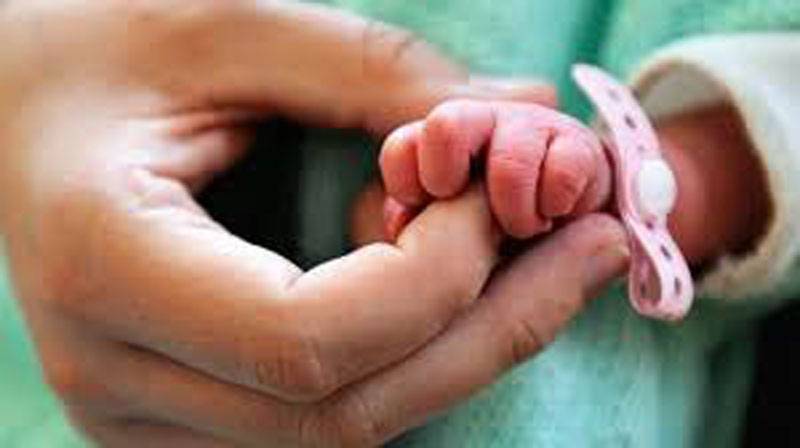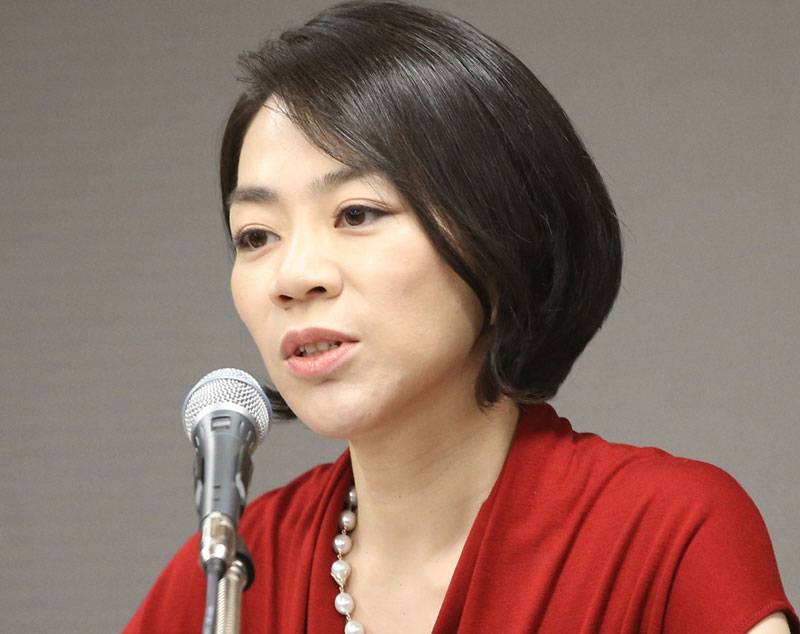‘Significant’ link between pre-eclampsia, autism
MIAMI (AFP): Children born to women who suffered a high-blood pressure condition called pre-eclampsia during pregnancy are twice as likely to have autism or other developmental delays, US researchers said Monday. The study in the journal JAMA Pediatrics, a journal of the American Medical Association, also found that the more severe the pre-eclampsia, the higher the likelihood of autism. The research involved more than 1,000 children aged two to three in northern California. All of their mothers had confirmed diagnoses of pre-eclampsia, and scientists compared data about those developing normally to those with autism spectrum disorder (ASD) or other developmental delays.
“We found significant associations between pre-eclampsia and ASD that increased with severity,” said senior author Cheryl Walker, assistant professor in the department of obstetrics and gynecology at the University of California, Davis.
“We also observed a significant association between severe pre-eclampsia and developmental delay.”
Autism spectrum disorder affects as many as one in 88 children in the United States.
The exact causes of the developmental disorder are unknown, with research pointing to genes, the environmental, or both.
Autism leads to difficulties in social, emotional and communication skills, and has no known cure.
Some past research has suggested that pre-eclampsia - which causes high blood pressure late in pregnancy and high levels of protein in the urine, as well as seizures in severe cases - could be linked to autism, perhaps by depriving the fetus of nutrients and oxygen.
“While single studies cannot establish causality, the cumulative evidence supports efforts to reduce pre-eclampsia and diminish severity, to improve neonatal outcomes,” Walker said.
Obama mocks himself on talk show
WASHINGTON (AFP): US President Barack Obama took on the role of talk show host late Monday, poking fun at himself during an appearance on Stephen Colbert’s satirical show. “The guy is so arrogant, I bet he talks about himself in the third person,” a grinning Obama said as he slipped into Colbert’s role. After Colbert praised US unemployment figures, Obama launched into a long answer on the need to raise the minimum wage in America. “I’ll give it to you. You’ve employed a lot of people ... mostly as secretary of Defense,” Colbert said, speaking several days after Obama nominated his fourth Pentagon chief in six years. “Well - that’s boosted our numbers a little bit,” the president shot back. Prying into the realm of day to day stuff, Colbert asked Obama if he does things like leave his socks on the floor. “I do,” the US chief executive said. And does he like his job? “I love the job. It’s an incredible privilege,” Obama said. “But when you’re in it, you’re not thinking about it in terms of titles.
You’re thinking about, how do you deliver for the American people, and also when I go home, Michelle, Malia, Sasha give me a hard time and there are no trumpets and they tease me mercilessly,” Obama said.
Colbert, who first became known as a commentator on the “Daily Show” hosted by Jon Stewart, another staple of US TV comedy, has hosted for nearly 10 years “The Colbert Report”, which is highly popular.
BEIRUT (AFP): Like a mirage in the middle of Beirut’s high-rise seafront, the exquisite mansion is a lonely reminder of this city’s romantic past. Rose House is an architectural gem, an Ottoman villa perched rather bizarrely next to an equally elegant lighthouse overlooking the Mediterranean. As newly built apartment blocks crowd in on its palm trees and delicate ochre-pink arches, it has become a symbol to Beirutis of the lightness and beauty their city seems to be losing. A rare survivor not just of the 15-year civil war that claimed so many of its historic mansions, but the building boom that came with peace from 1990, it is even said to haunt some of their dreams.
The villa that once hosted French president Charles de Gaulle and American abstract artist John Ferren — a friend of Picasso — also inspired a film, “Around the Pink House”.
Yet its fortunes declined over the years.
But a chance visit by British painter Tom Young and his wife as they strolled along the seafront, together with the enthusiasm of a Lebanese property developer, has brought hope that the villa will be restored and revived.
The couple found their way into the villa, where they met its tenant, Fayza al-Khazen. She told them that her brother Farid, himself a painter, had used it as a meeting place for other artists during Lebanon’s golden age of the 1960s and 1970s.
When 71-year-old Khazen offered Young the chance to paint at La Maison Rose, as it’s known in the city’s francophone community, he jumped at the chance.
But her lease was up at the end of the summer and Khazen had to leave.
“I was quite concerned about what was going to happen to the building,” said Young.
Fortunately, villa owner and real estate developer Hisham Jaroudi was happy to let Young exhibit his work there, and to open it to the public for a time.
“This house will live on,” said Jaroudi, who bought Rose House several years ago.
“It will be renovated and turned into a museum where Beirut’s history can be preserved,” he told AFP.
Young can barely contain his excitement at being able to use the site as an art centre until the end of this year.
“This place is like a fairytale!” he told AFP.
Tiles and stained glass windows give colour to the villa’s interior.
Black-and-white photographs of the Ardati family, who lived there in the early 20th century, and the works of now-deceased Farid Khazen, haunt the villa from across the years.
“These places embody a culture and identity which must be preserved,” said Young, a 41-year-old from Northamptonshire who studied Islamic architecture in Istanbul.
“Buildings like this are so unique to Lebanon; they are very important for its cultural identity... There is a wisdom about them which really needs to be protected,” he said as he sat on a balcony overlooking a lush garden.
Activists have long lamented the disappearance of Beirut’s beautiful traditional homes.
From 1995 to 2010, the number of traditional villas around downtown Beirut alone plummeted from 1,200 to 400.
Young’s link with Lebanon dates back to 2006, when a Lebanese car mechanic in London commissioned him to paint scenes from home because “he missed it so much”.
Since then, Young has been in love with the country. Its complex and painful history and civil war remind him of a tragedy in his own life, when he was only 10 years old.
“My mother took her own life, and this has had a seminal effect on everything I have done since,” Young said.
“I was fascinated by the contradictions of Lebanon,” Young said. “How can a place be the ultimate hell and also such a paradise?”
Now, he dreams of turning Beirut’s remaining old villas into art centres.
“I try to use art as a way to save these places,” Young said.
One of his paintings, entitled “Years”, shows piles of rubbish on a beach. To Young, it is “symbolic of the dysfunction of the state”.
Another canvas shows Rose House being crushed by monstrous towers.
“I think these wonderful places should be enjoyed by all people, of all classes, all ages and all religions,” said Young.
He also said children have visited Rose House, some of who come from “very disadvantaged backgrounds... Children come to learn and dream.”
During Young’s show, a video interview with Fayza al-Khazen delivers a message of hope for visitors.
“I hope that if this house is renovated it will be a sign that Lebanon is also being renewed,” she said.
Korean Air CEO’s daughter resigns
SEOUL (AFP): The daughter of Korean Air’s CEO resigned Tuesday after being widely criticised for having the chief purser kicked off a plane because of the way she had been served some nuts. Cho Hyun-Ah, a top executive in Korean Air’s in-flight service, forced the New York-Seoul flight to return to its gate last Friday to remove the most senior member of the crew, causing the plane to be delayed. Her behaviour attracted heavy criticism in South Korea, where she was accused of being petty and arrogant, and even prompted a state probe over a possible breach of aviation safety laws. “I feel so sorry for our customers and South Koreans for causing such trouble... and seek forgiveness from the people who might have been hurt by me,” Cho, 40, said in a statement released by Korean Air. “I will resign from all my posts at Korean Air to take responsibility for the incident,” she was quoted as saying.
Korean Air CEO Cho Yang-Ho immediately accepted her resignation, according to the statement.
Korean Air’s spokesman told AFP that Cho would retain the title of vice president even though she no longer had any official role in the company, adding it was not clear whether she would hold any responsibilities in the future.
The Seoul flight had just left its gate at New York’s JFK airport on Friday when the incident occurred.
Cho, sitting in first class, took exception to the arrival of some macadamia nuts she had not asked for, and to the fact that they were served in a packet rather than a bowl.
She summoned the chief purser who, according to an earlier Korean Air statement, replied with “lies and excuses” when challenged over his crew’s knowledge of in-flight service procedures.
Cho then decided the chief purser was “incapable” and the plane returned to the gate where he disembarked, causing an 11-minute delay in arrival.
Korean Air - South Korea’s flag carrier - earlier apologised for causing “inconvenience” for passengers but defended Cho’s action as a “reasonable” move to improve in-flight service.
It also argued that the final decision to deplane the employee was taken by the captain.
Transport Minister Suh Seoung-Hwan said earlier Tuesday the incident was being investigated and any regulatory breach would be “handled sternly”.
The media backlash against Cho has been extensive.
“This ugly behaviour by the Korean Air boss’s daughter puts the entire nation to shame,” Seoul’s top business daily, the Maeil Business Newspaper, said in an editorial.
“This is a global embarrassment for South Korea... Korean Air should punish Cho, and she should apologise to the public for disregarding passengers’ safety,” it said.
The Dong-A Ilbo newspaper said Cho’s action had exposed the “sense of entitlement and supercilious attitude” prevalent among the rich.
“Apparently some members of owner families like Cho see their companies like their own kingdom,” it added.
Cho, one of the CEO’s three children, joined Korean Air in 1999 and was promoted to vice president this year.
A major Seoul civic group joined the fray, saying it would ask prosecutors to investigate Cho for a potential breach of aviation safety laws and disruption of business.
“Given the suffering of the cabin crew who were subject to such insult and abuse... the prosecutors should launch an investigation immediately to prevent similar abuse by high-level company executives in the future,” People’s Solidarity for Participatory Democracy said in a statement.
A formal request for the probe would be filed Wednesday, it added.
Mechanism behind sugar greed found
LONDON (Reuters): British scientists have found a brain mechanism they think may drive our desire for glucose-rich food and say the discovery could one day lead to better treatments for obesity. In experiments using rats, researchers at Imperial College London found a mechanism that appears to sense how much glucose is reaching the brain and prompts animals to seek more if it detects a shortfall. In people, the scientists said, it may play a role in driving our preference for sweet and starchy foods. Glucose, a component of carbohydrates, is the main energy source used by brain cells. “Our brains rely heavily on glucose for energy,...but in our evolutionary past it would have been hard to come by. So we have a deep-rooted preference for glucose-rich foods and seek them out,” said James Gardiner, who led the study and published its findings in the Journal of Clinical Investigation on Monday. Gardiner’s team started with a hypothesis that an enzyme called glucokinase, involved in sensing glucose in the liver and pancreas, might play a role in driving glucose desire. Glucokinase is found in part of the brain called the hypothalamus, which regulates various functions including food intake.
In their experiments they first found that when rats go 24 hours without eating, glucokinase activity in an appetite-regulating centre in the hypothalamus increases sharply.
The rats were given access to a glucose solution as well as their normal food pellets, called chow. When the researchers increased the activity of glucokinase in the hypothalamus using a virus, rats consumed more glucose in preference to chow. When glucokinase activity was reduced, they consumed less glucose.
Gardiner suggested that in people it might be possible to reduce glucose cravings by changing the diet, and said a drug that could act on this system may potentially prevent obesity.
“People are likely to have different levels of this enzyme, so different things will work for different people,” he said in a statement about the study.
“For some people, eating more starchy foods at the start of a meal might be a way to feel full more quickly by targeting this system, meaning they eat less overall.” (
Romania to change law to save ‘hero dog’
BUCHAREST (AFP): Romania on Monday ordered legal changes to save an ailing Alsatian that has served in Afghanistan from being put down because the state does not take charge of retired military dogs.
The fate of five-year-old Max, who has served on two missions in the war-ravaged country sniffing out explosives, has whipped up passions with an online petition to save the “hero dog” gathering nearly 27,000 signatures. Max risked being sent to a dog shelter or being put down as there is no legal provision in Romania for the government to take over the upkeep of canines once they are off the defence rolls. An emotive media campaign was headlined “Sent to die by those whose lives he saved,” forcing Defence Minister Mircea Dusa to order changes to ensure the government takes over the upkeep of retired military dogs. Dusa said this should be done by this week.
He also asked parliamentary experts to look into how his ministry could be allocated a budget for this purpose. An animal lover has in the meantime adopted Max while others donated money to ensure he gets medical treatment. The dog’s medical costs are roughly 150 euros ($180) a month.










